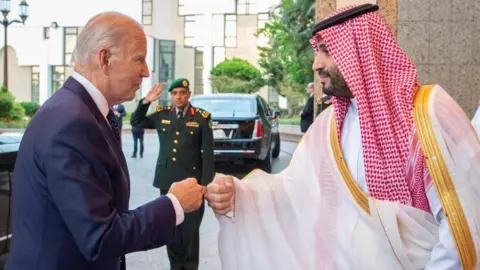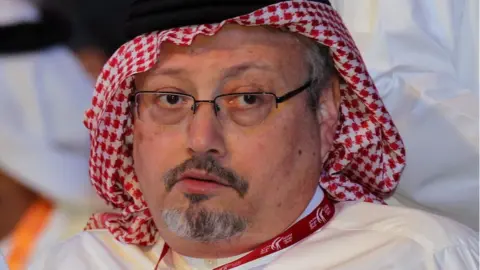Saudi Arabia: Biden meets crown prince amid criticism
 Reuters
ReutersUS President Joe Biden has met the crown prince of Saudi Arabia - a nation he once pledged to make a "pariah" over its human rights record.
Mr Biden fist bumped Mohammed bin Salman as he arrived for talks aimed at repairing the relationship between the two nations.
The president has been criticised over the trip after the murder of journalist Jamal Khashoggi by Saudi agents.
While initially there was little friendliness or warmth from Mr Biden - something he has often shown when meeting other world leaders - their meeting is significant.
The US-Saudi relationship faced a serious challenge with the 2018 murder of Jamal Khashoggi, a US-based journalist who wrote for the Washington Post.
Crown Prince Mohammed was accused by US intelligence agencies of approving the murder. The prince denied the allegations, and Saudi prosecutors blamed "rogue" Saudi agents.
When he was campaigning for the presidency in 2019, Mr Biden vowed to make Saudi Arabia "the pariah that they are" for killing Khashoggi.
He also refused to talk with Mohammed bin Salman when he first became president - until now.
Mr Biden has faced a storm of criticism over his decision to visit the kingdom and meet with its de facto leader. It comes at a time of near record oil prices in the US, with the president expected to push Saudi officials to commit to increasing production.
 EPA
EPAThe White House has downplayed Mr Biden's meeting with Prince Mohammed, saying he will also be meeting other Arab leaders when he attends a conference in Jeddah on Saturday.
Meanwhile, it has been revealed to the BBC that a Saudi American businessman in his 70s - whose case has not been disclosed before - has been detained without charge by the Saudi authorities since November.
The information came from a member of his family, who requested anonymity. Relatives of those held there often do not make the cases public as they fear the consequences of doing so.
The man went missing on his arrival in Saudi Arabia last November. The member of his family believes his detention may be due to social media posts critical of the Saudi authorities.
A source at the US State Department told the BBC that the department had no higher priority than protecting US citizens abroad, but that for privacy reasons it would make no further comment.
Saudi Arabia opens airspace
The president flew into the city of Jeddah directly from Israel - something previously banned.
Saudi Arabia, which does not officially recognise Israel and for decades led a regional boycott of the Jewish state, earlier announced it would allow "all carriers" to use its airspace, seen as a conciliatory gesture to Mr Biden and Israel.
The president is aiming to broaden Israel's integration in the region, especially in the field of security and defence, as part of efforts to counter the threat from Iran.
Saudi Arabia and Iran are regional rivals, while Israel considers Iran its most dangerous foe. Iran does not recognise Israel's right to exist and has repeatedly called for its elimination. Mutual concerns about Iran have led to unofficial security and intelligence ties between Saudi Arabia and Israel.
As President Biden began his tour, Iran's navy on Friday unveiled its first division of ships and submarines capable of carrying armed drones.
Saudi Arabia has long been an important regional ally to the US, serving as a major oil supplier and buying billions of dollars of US weaponry. However, ties have been tested in recent years, with a US pivot towards Asia, withdrawal of forces and air defence capabilities from the Middle East and Mr Biden's declared prioritisation of human rights as a plank of his foreign policy.
Additional reporting by the BBC's Arab affairs editor Sebastian Usher.
